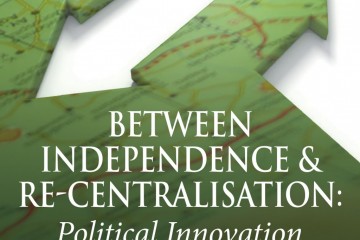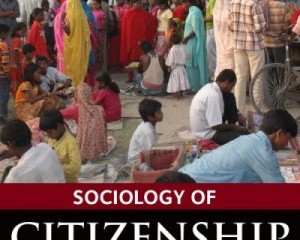
The Metropolitanisation of Nationality? City-regions, autonomy and the territorial state
The recent plebiscite on Scottish independence has triggered a much wider debate in the UK about the organisation of state power in institutional and territorial terms.
In particular, the role and economic position of the main cities vis-à-vis the state have raised headlines about ‘cities going independent’, such as ‘Devo Met’ (The Economist, 25 Oct 14). This not only continues the strong focus on the economic dimension of statehood and its territorial and institutional manifestation, but also that of identity and the sense of community (commonality). No longer, so it seems, does nationality operate automatically through the ‘nation state’ as a territorial and governmental entity. Instead, metropolitanism is encouraging, perhaps requiring, a ‘reterritorialisation of politics’ (Sellers and Walks, 2008). This growing emergence of an urban (metropolitan) dimension to national (and international) discourses on shared values, imaginations and common purpose has come to challenge the nationalisation thesis formulated as part of ‘political modernisation’ (Hofferbert and Sharkansky, 1971), and its primary focus on territorial states as expressions of an existing and cohesive civil society, or as ‘nationalisers’ seeking to shape a national identity (Brubaker, 1995). This once prevailing thesis propagates national contexts as dominant, hegemonial conditioning factors which reach across states, including regional and local identities and discourses, whether urban or not. The understanding of nationality has thus been viewed from a top-down perspective of discursive nationality, and corresponds with the territorial view that cites, being down the scalar hierarchy from the state, are automatically an integral part of that – bigger – entity – geographically, institutionally and discursively.
Such, in effect, triple hierarchisation – where territory, institutional power structures and discourse of identity and belonging (communality) sit in parallel hierarchical arrangements – is now being challenged by a growing urban/metropolitan voice stepping out of the seemingly homogenous sonority of a national discursive ‘backcloth’. This may appear as a reverse step to the integrative, even homogenising, effects of nationalising politics (Caramani, 2004), seeking to overcome spatial and societal differences in identities and sense of belonging. From such a (conventional) perspective, states are seen as the ‘natural’ rallying points of national discourses of self-determination and their geographic manifestation.

Between Independence & Re-centralisation: Political Innovation in an Age of Devolution
In 2014 the push for devolution became a major political issue. Scotland remains in the UK, but only after last minute bargaining devolved further powers to Holyrood. This has encouraged calls for more devolution of powers to Scotland, Wales, Northern Ireland and for the formation of an English parliament. George Osborne’s Autumn Statement proves that Westminster is listening. Meanwhile, MPs and local governments want more powers entrusted to local authorities. Manchester is following Bristol’s lead in appointing a mayor.
The UK is not alone in this trend. Emboldened by the experience in Scotland, Catalonia held an independence vote of its own, even if unrecognised by the government in Madrid. Legal or not, that vote may also boost efforts in the Basque Country, Bavaria and Flanders.
While these votes may prove unsuccessful, the tension surrounding them will linger. The issues depend on the contextual consequences of the increasing trend towards devolution. There are two forces operating in two different directions: on the one hand, city/regional small nations are demanding Independence from their referential nation-states, while on the other hand, nation-states themselves are re-centralising or decentralising their structures and powers.
Over the coming months, this Special Series will focus on the diverse angles to this debate by identifying and emphasising certain innovative and thought provoking case studies for the purpose of comparison.
Posts will cover topics like the re-scaling of nation-states, constitutional change, the right to decide, independence movements, the federal EU hypothesis, the Europe of Regions approach, democratic participation and civic nationalism in relation to city-regions.

Four options for configuring the British constitution
Inbuilt within the United Kingdom is the potential for instability. It is a multi-nation state, like Belgium, Canada, Spain and – some would say – the European Union. At present, it consists of three nations – Wales, Scotland and England; and a fourth territory, Northern Ireland, the status of which is complicated and controversial. This internal differentiation is not necessarily a weakness. But it has at times been a source of problematic tension. Pressure for more autonomy, or even secession, has come from within some of the national groups incorporated into the UK. Early in the history of the state, during the eighteenth century, Scottish Jacobite rebellions took place. The place of Ireland within the UK has often been a …

Plurinational citizenship in the making
In 2009, after a long and contentious process of national dialogue that led to the approval of a new Constitution, the Republic of Bolivia officially changed its name to Plurinational State of Bolivia.
Over the last decade, the idea of plurinationalism has influenced public debates across the Andean region. In 2008, the Ecuadorian president Rafael Correa defined plurinationalism as the coexistence of several different nationalities within a larger state where different peoples, cultures and worldviews exist and are recognized. Yet, Bolivia was the first country to go all the way, not only including this idea in the Constitution (as Ecuador did) but actually changing its official name. This is not just a formality. The new Bolivia is engaging in a process of in-depth institutional reforms, challenging mainstream narratives and political structures and reinventing a model of the state and creating notions of citizenship better suited to highly diverse ethnic and cultural landscapes.
In Latin America, the effort to challenge assimilationist and universalist models of citizenship (both republican and corporatist) took shape during the 1990s, when multicultural politics emerged and culture and identity became legitimate political claims. However, multiculturalism was not an easy partner for the neoliberal consensus, and claims for collective (rather than individual) rights and for territorial autonomy raise what Deborah Yashar (1999) calls a “postliberal challenge”. While concepts such as multiculturalism and pluricultural citizenship were a key part of the neoliberal agenda, it was with the Leftist turn in the following decade that the more radical idea of a plurinational state took shape. In Bolivia, the election of Evo Morales as President in 2005 and the rise of the Movement Towards Socialism (MAS) gave political meaning to plurinationalism as an alternative model of state and citizenship, which was meant to overcome the neoliberal multicultural framework for diversity management.

A citizen’s income and wealth fund for the UK: Lessons from Alaska
The idea of a ‘citizen’s income’ has made a real splash on the UK political agenda. The new year started with the Green party announcing a universal, non-means tested weekly payment of £72 to every British adult as its flagship economic policy, only to drop it this week from the party election manifesto after the programme’s costing failed to withstand rigorous scrutiny. Despite this step back, the citizen’s income idea may still feature in the election debate, given calls late last year by key Liberal Democrats for a universal basic income to become official party policy. And while the Greens have distanced themselves from the policy for the duration of the election, Green MP Caroline Lucas has identified the scheme as a long-term …

A preamble for a written constitution in the UK
Recently the Political and Constitutional Reform Committee ran an open public competition to find who can write the best Preamble – or introductory statement – for a modern Written Constitution for the UK. We are delighted to announce that Richard Elliot, a DPhil student at Jesus College, Oxford, was selected as winner in the public category. His Preamble reads, United, we stand in celebration of the diverse voices that make up the great chorus of our nation. Confident in our individuality, and steadfast in our shared values and common purpose, we—the citizens of the United Kingdom of Great Britain and Northern Ireland—have come together in the spirit of self-determination in order to establish the principles of our law and governance. By this …

The politics of a written constitution for Britain
The first issue concerning a written constitution for Britain is: Where is the demand coming from? Contemporary organised demand for constitutional reform traces back to the late 1970s, yet even before then, isolated intellectuals – ‘a voice crying in the wilderness’ – had tried to make an issue out of a written constitution for Britain that would include a Bill of Rights. The term ‘norm entrepreneur’ is sometimes used in politics and international relations to refer to pioneers who, dissatisfied with the status quo, take action to change it at their own initiative. They may make an impression on the world even if their personal cause ultimately fails. A norm entrepreneur is typically an individual, but may be a collective actor …

The Sociology of Citizenship
Political theorists, sociologists and anthropologists are increasingly open to the idea that citizenship goes beyond the legal status conferred by states upon individuals in a national political community. The contributors to this series will focus on the concrete, empirical ways in which people make meaning of citizenship and the manner in which they forge and imagine membership in the political community. Contributors will draw on their on-going research in different parts of the world, including South Asia, the Middle East, Eastern Europe, Africa and Latin America.









